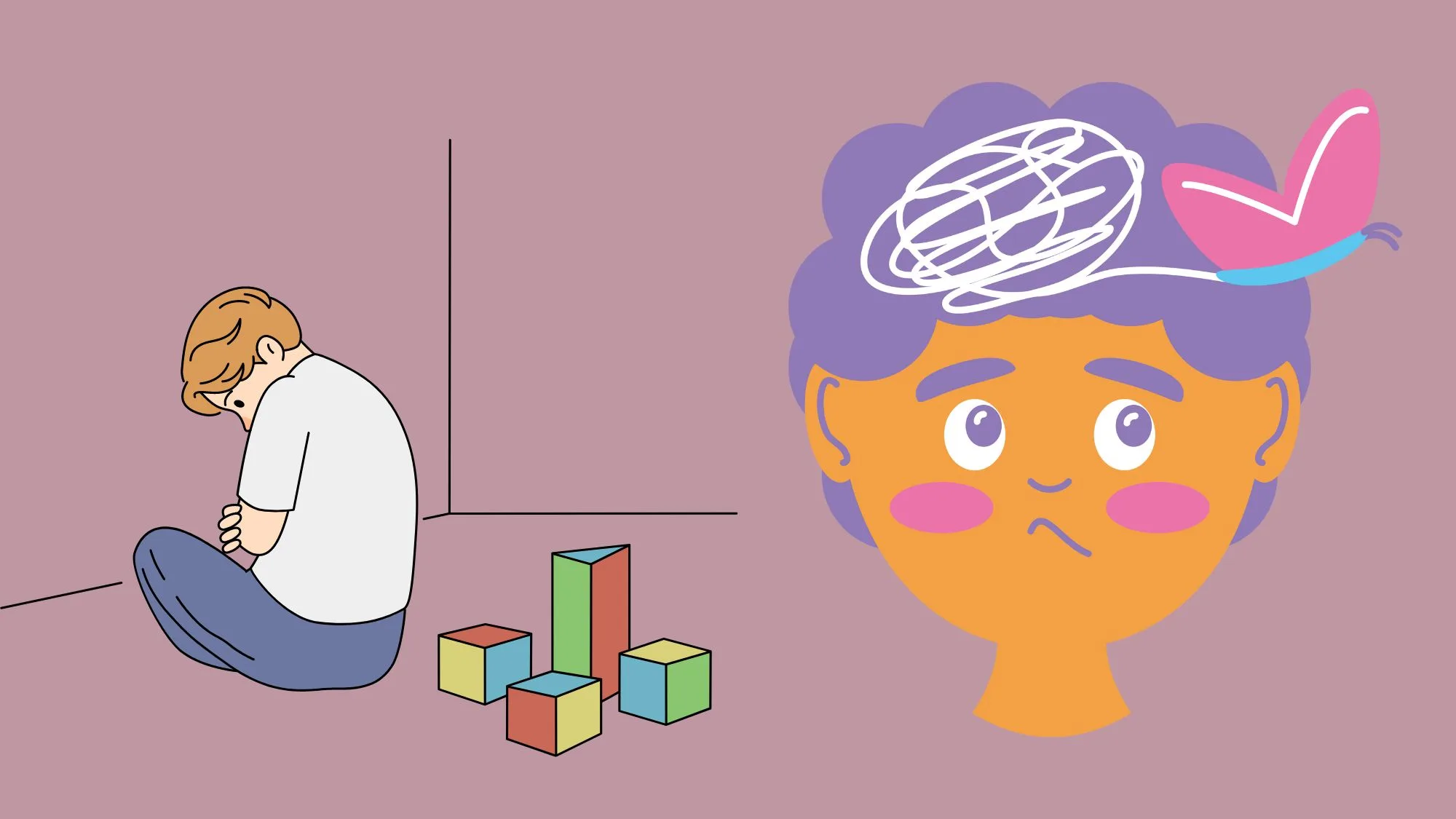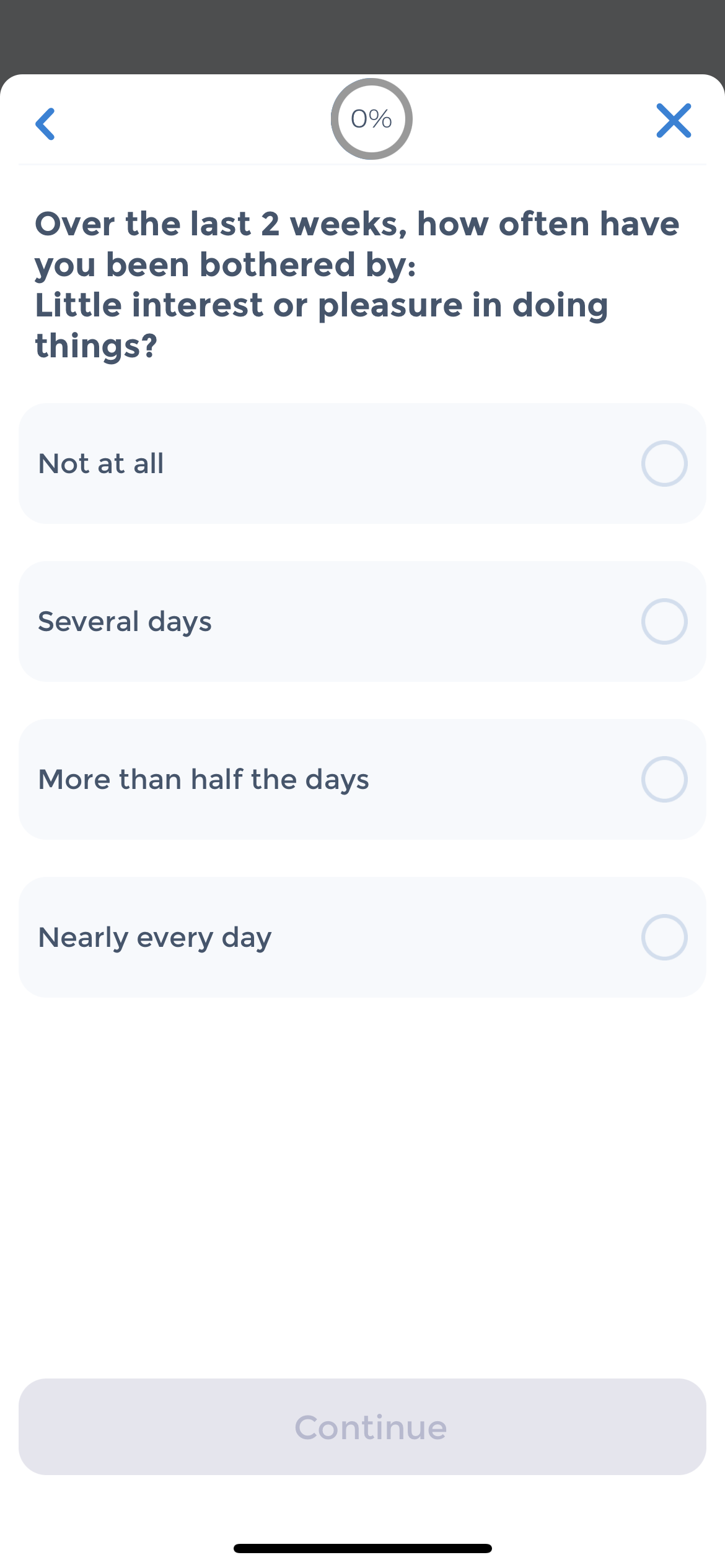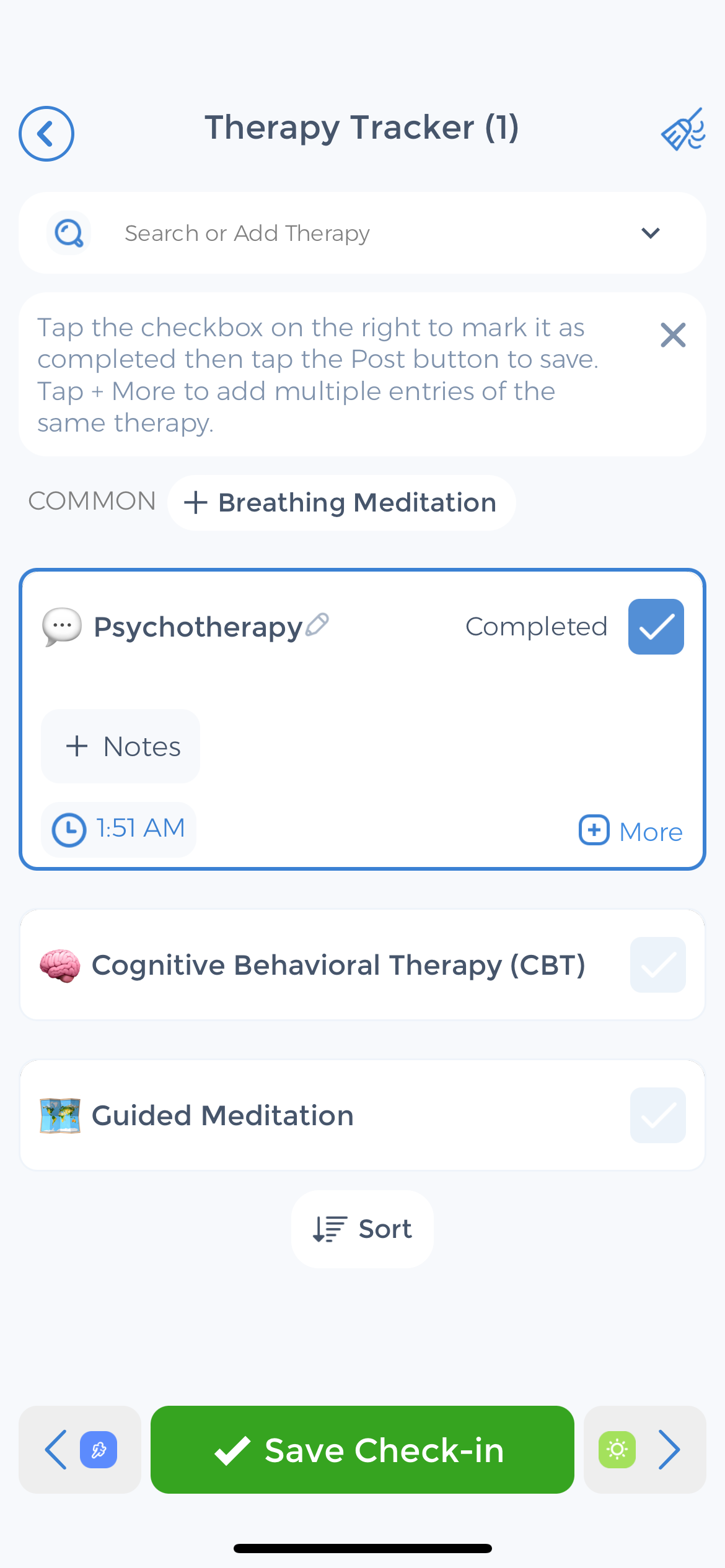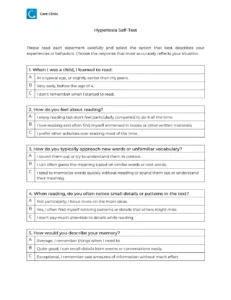
As a parent, you always want the best for your child. You celebrate their milestones and watch them grow and develop with a mixture of pride and wonder. However, sometimes a child’s development does not progress as expected. If your child exhibits signs of advanced reading skills at an early age but struggles with language, social, and communication skills, they may have hyperlexia. Hyperlexia is a neurodevelopmental disorder that impacts learning and social abilities. The Hyperlexia Test is a free online assessment you can take to determine if your child’s abilities and behaviors align with a hyperlexia profile.
Understanding your child’s needs and abilities is crucial to helping them thrive. The Hyperlexia Test provides insight into your child’s learning profile so you can implement the best strategies and interventions to support their growth. While a hyperlexia diagnosis can be worrying, the good news is that with early identification and the proper support, children with hyperlexia can develop coping mechanisms and strategies to lead full, happy lives. Take the free Hyperlexia Test today to gain valuable understanding into your child’s development.
Taking the Free Online Hyperlexia Test
Taking the free online Hyperlexia Test is an important first step to determine if you or your child exhibits symptoms of Hyperlexia. Hyperlexia is a neurological condition characterized by an intense fascination with words and letters, and an advanced reading ability.
What is the Hyperlexia Test?
 The Hyperlexia Test is a free, 10-15 minute online assessment consisting of multiple questions to help identify key traits associated with Hyperlexia. It evaluates behaviors and abilities in areas such as:
The Hyperlexia Test is a free, 10-15 minute online assessment consisting of multiple questions to help identify key traits associated with Hyperlexia. It evaluates behaviors and abilities in areas such as:
- Word recognition: Does the individual have a strong ability to recognize letters, read words and pronounce complex terms?
- Reading comprehension: While the individual may read fluently at an advanced level, do they fully understand the meaning? Comprehension is often delayed.
- Social and communication skills: Individuals with Hyperlexia typically have challenges with social interaction, eye contact, imaginative play and expressing emotions or needs.
- Repetitive behaviors: Excessive repetition of words, questions or routines is common. The individual may spend a significant amount of time reading, reciting or copying words and letters.
- Sensory sensitivities: Heightened sensitivity to sounds, lights, textures or smells frequently co-occurs with Hyperlexia.
The results of the Hyperlexia Test can help determine if further evaluation by a professional is recommended to confirm a diagnosis and guide treatment options.
Why Take the Test?
Taking the free Hyperlexia Test provides valuable insights into your or your child’s development and abilities. A diagnosis of Hyperlexia at an early age means early intervention and support services can be put in place to encourage social development and learning. Appropriate educational programs, speech therapy, occupational therapy and behavior therapies have been shown to significantly improve long term outcomes for individuals with Hyperlexia.
The Hyperlexia Test is a helpful first step to determine if the characteristics of Hyperlexia are present. A timely diagnosis and tailored support services can have life-changing benefits for both the individual and their family. I highly recommend taking this free online assessment.
Printable Hyperlexia Text
⬇️ Printable Hyperlexia Test PDF
Interpreting Your Hyperlexia Test Results
The Hyperlexia Test is designed to determine if a person exhibits symptoms of hyperlexia, which is a precocious ability to read at an early age combined with significant difficulties in other areas of language and communication. If the test indicates possible hyperlexia, it does not provide a diagnosis but can suggest next steps to pursue with a medical professional.
Scoring the Test
If the test indicates possible hyperlexia, the next step is to consult with a speech-language pathologist, developmental pediatrician, or psychologist for a complete assessment. They can evaluate reading ability, language skills, and social development to determine if a diagnosis of hyperlexia or a related disorder is appropriate and recommend next steps for management and support.
What is Hyperlexia?
Hyperlexia is a disorder characterized by precocious reading ability. Children with hyperlexia exhibit strong word recognition and decoding skills at a very early age, often before age 5. However, their reading comprehension and language abilities are below average for their age.
Common Signs of Hyperlexia
 Some common signs of hyperlexia in young children include:
Some common signs of hyperlexia in young children include:
- Reading simple words and sentences before age 2.
- Strong visual memory for letters, numbers, and written language.
- Decoding skills surpassing comprehension. The child can read words and sentences but struggles to understand meaning.
- Fixation on letters, numbers, and written symbols. The child shows an intense interest in the shapes and sounds of written language.
- Echolalia or repeating phrases and sentences. The child frequently echoes what others say.
- Difficulty with imaginative play. The child struggles with pretend play and role playing.
- Challenges with social interaction and communication. The child has trouble relating to peers and picking up on social cues.
The Importance of Early Intervention
If your child shows signs of hyperlexia, early intervention is critical. Early diagnosis and support services can help strengthen language abilities and social skills. Speech therapy, occupational therapy, behavioral therapy, and play-based interventions are often recommended.
With professional support, children with hyperlexia can develop strong reading comprehension and become highly verbal. However, some challenges with social interaction and communication may persist into adulthood.
The Hyperlexia Test is an informal online assessment that can provide valuable insights into your child’s abilities and behaviors. The test results and recommendations can help guide conversations with doctors, therapists, and support groups. Gaining a better understanding of hyperlexia and available resources will allow you to support your child’s development from an early age.
Signs and Symptoms of Hyperlexia
Hyperlexia is a disorder characterized by precocious reading ability in children, often before age 5. Children with hyperlexia read earlier and faster than their peers, but have difficulty comprehending what they read and struggle with language and social skills. Some key signs of hyperlexia include:
Early Reading Ability
Children with hyperlexia learn to read at a very young age, sometimes before age 3. They quickly master phonics and memorize whole words, reading far above their expected level. While this seems advantageous, their reading is often non-comprehensive. They read for the enjoyment of reading itself, not understanding the meaning.
Delayed Language Development
Though children with hyperlexia read early, their verbal and language abilities are often delayed. They struggle to communicate effectively and have limited social skills. Speech may be repetitive or echolalic, directly quoting things they’ve read or heard. They tend to interpret language literally and have difficulty with abstract concepts.
Fixated Interests
Children with hyperlexia frequently become intensely focused on specific topics, objects, or activities. They obsessively read about and collect information on their fixated interests. While this can be a source of enjoyment, their interests tend to dominate their time and conversations, further isolating them from peers.
Sensory Sensitivities
Many children with hyperlexia are overly sensitive to sounds, lights, smells, and touch. They may be distressed by loud noises, avoid eye contact, and dislike being hugged or held. These sensitivities, combined with their delayed language and social skills, can make social situations very challenging and anxiety- provoking.
Rigid Routines
Children with hyperlexia tend to thrive on routines and repetition. They become distressed by changes in schedules or environments and have a hard time adapting to transitions or new situations. Maintaining a predictable set of routines and schedules is important for their wellbeing and development.
The Hyperlexia Test can help determine if a child exhibits signs of hyperlexia so proper diagnosis, treatment and support can be provided. Early intervention is key to helping children with hyperlexia develop language, social and life skills that will allow them to thrive.
Why Early Detection Is Crucial
Early detection of hyperlexia is vital for the development and wellbeing of a child. By identifying the signs and symptoms of hyperlexia as early as possible, parents and caregivers can get their child the support and interventions they need to thrive.
The test questions focus on areas such as:
- Precocious reading ability at a young age
- Advanced decoding and word recognition skills
- Below-average social and communication skills
- Narrow interests or fixations on letters, numbers, or sequences
- Echolalia or scripting (repeating words, phrases or scripts from movies/TV shows)
By evaluating a child’s skills and behaviors across these domains, the Hyperlexia Screening Test can identify children who may be at risk for hyperlexia or a related disorder on the autism spectrum. Early detection means early intervention, and the sooner a child begins receiving speech, social skills and occupational therapy, the better their long-term outcomes can be.
Seek Professional Diagnosis and Support
If the results of the online screening test suggest the possibility of hyperlexia or a related condition, it is important to have the child formally evaluated by a doctor or psychologist. A professional diagnosis, based on a combination of test results, observations and reports from parents and teachers, is needed to develop a customized intervention and education plan. The earlier the interventions begin, the more significant and long-lasting their impact can be on the child’s development and quality of life.
Identifying the signs of hyperlexia as early as possible and taking a screening test is key. Early detection leads to early support through professional diagnosis and customized interventions. When children get the help they need from an early age, their outcomes and ability lead to independent and fulfilling lives greatly improve. The future is bright when hyperlexia is detected early.
Hyperlexia Test FAQs: Common Questions Answered
The Hyperlexia Test is an important tool for determining if a child may have hyperlexia, a disorder characterized by precocious and early reading ability. Many parents have questions about what the test entails and how to interpret the results. Here are some of the most frequently asked questions about the Hyperlexia Test:
What is the Hyperlexia Test and what does it measure?
The Hyperlexia Test is a standardized assessment that measures a child’s reading ability, language skills, and social development. It evaluates skills such as word reading, reading comprehension, vocabulary, verbal reasoning, and social cognition. The test aims to determine if a child demonstrates a reading level well above what is expected for their age, which can indicate hyperlexia.
How is the test administered?
The Hyperlexia Test is administered through a series of verbal questions, visual exercises, and interactive tasks. It takes between 1 to 2 hours to complete and is overseen by a licensed psychologist, speech language pathologist, or other qualified professional. The test may be done in one longer session or over multiple shorter sessions based on the child’s needs.
What do the results indicate?
The results of the Hyperlexia Test determine if a child’s scores in reading, language, and social skills are significantly higher than average for their age, which can point to a diagnosis of hyperlexia. However, a diagnosis of hyperlexia also depends on observations of the child’s behavior and development. High scores on reading and language subtests combined with challenges in areas like social communication or flexible thinking are characteristic of hyperlexia.
What happens after the test?
If the test results and other assessments indicate a high likelihood of hyperlexia, the child may receive a diagnosis from a medical professional such as a developmental pediatrician. A diagnosis can help in developing targeted interventions and strategies to address the child’s needs. Early intervention and support services may help strengthen language, social, and adaptive skills development.
In summary, the Hyperlexia Test provides valuable information to determine if a child demonstrates hyperlexia. Understanding the test, how it is administered and interpreted, and next steps after testing will help parents navigate the process and get their child the support they need.
Takeaways
The Hyperlexia Test is an important tool to determine if you or your child exhibits signs of this developmental disorder. Hyperlexia is a complex condition that requires support and intervention to thrive. By taking a few minutes to complete this free online assessment, you gain insights into your abilities and challenges. You can then consult medical professionals to discuss next steps for management and treatment.
Do not delay in taking action if the results indicate hyperlexia. Early intervention and support services have been shown to significantly help those with this disorder reach their full potential. Knowledge is power, so take the Hyperlexia Test today to better understand yourself or your child.



